Unit1 现代大学英语精读第一册Half a Day答案
现代大学英语精读1.lesson1_halfaday

Lesson 1 – Half a Day
The end of His works.
Lesson 1 – Half a Day
III. The world in his works
The picture of the world as it emerges from the bulk of Mahfouz’s work is very gloomy indeed, though not completely disappointing. It shows that the author’s social utopia is far from being realized. Mahfouz seems to conceive of time as a force of oppression. His novels have consistently shown time as the bringer of change, and change as a very painful process, and very often time is not content until it has dealt his heroes the final blow of death.
prayer for the new age—Maitreya
The end of Creator of the Universe.
Christians believe that the
world was created by God. So here “Creator”
means God.
Lesson 1 – Half a Day
To be continued on the next page.
现代大学英语1 unit 1 half a day

第十三页,共五十一页。
Example in the text
Comprehensive Reading ---- The author
His writing style
This technique is often used to emphasize
rapid changes in society.
第二页,共五十一页。
Lead-in Activity
Direction :
Work in pairs or groups and discuss.
第三页,共五十一页。
Lead-in Activity
Q1
Was it hard for you to leave home for the first time in your life?
2021/12/31
第十二页,共五十一页。
Example in the text
Comprehensive Reading ---- The author
u 山中方一(七)日, 世上(shìshàng)已千年。
2021/12/31
u 《水经注》
u “信安山(烂柯山)有石室,王质 入其室,见二童子对弈(duì yì),看 之。局未终,视其所执伐薪柯已烂 朽,遂归,乡里已非矣。”
The following are a few possible understandings of the message the author intends to convey? Which do you agree with?
2021/12/31
第二十四页,共五十一页。
Comprehensive Reading
现代大学英语精读(第二版)第一册课后练习答案(全册)
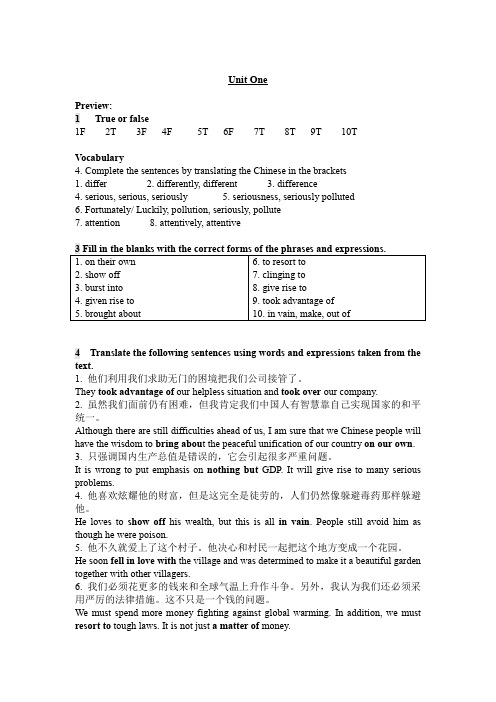
Unit OnePreview:1 True or false1F 2T 3F 4F 5T 6F 7T 8T 9T 10TVocabulary4. Complete the sentences by translating the Chinese in the brackets1. differ2. differently, different3. difference4. serious, serious, seriously5. seriousness, seriously polluted6. Fortunately/ Luckily, pollution, seriously, pollute7. attention 8. attentively, attentive4 Translate the following sentences using words and expressions taken from the text.1. 他们利用我们求助无门的困境把我们公司接管了。
They took advantage of our helpless situation and took over our company.2. 虽然我们面前仍有困难,但我肯定我们中国人有智慧靠自己实现国家的和平统一。
Although there are still difficulties ahead of us, I am sure that we Chinese people will have the wisdom to bring abou t the peaceful unification of our country on our own.3. 只强调国内生产总值是错误的,它会引起很多严重问题。
It is wrong to put emphasis on nothing but GDP. It will give rise to many serious problems.4. 他喜欢炫耀他的财富,但是这完全是徒劳的,人们仍然像躲避毒药那样躲避他。
《现代大学英语精读1》第1课Half-a-Day-课文讲解

Half a DayNaguibMahfousAbout the AuthorName: NaguibMahfous纳吉布·马哈福兹Nationality:EgyptianDates: From Dec.1911 to Aug. 2006 Birthplace:an old quarter of CairoEducation: studied philosophyat auniversity ofCairo, graduating in 1934.Job: in university administrationas a civil servantas a journalist(记者)Influence: 1st Arab to win the Nobel Prize for literature in 1988described as "a Dickens of the Cairo cafés" and "the Balzac of Egypt".Half of his novels have been made into filmsAbout the AuthorWorks: no fewer than 30 novels, more than 100 short stories, and more than 200 articles●the Cairo Trilogy in 1957●Children of Gebelawi in 1959 (Prize novel for the reasonthat "who, through works rich in nuance - nowclear-sightedly realistic, now evocatively ambiguous -has formed an Arabian narrative art that applies to allmankind"(他通过大量刻画入微的作品—洞察一切的现实主义,唤起人们树立雄心—形成了全人类所欣赏的阿拉伯语言艺术)●the Thief and the Dogs in 1961《小偷与狗》●Small Talk on the Nile in 1966《尼罗河上的絮语》About the Half a Day●First published in Arabic in 1989as part of a short story collectionentitled The False Dawn.●Included in an English-language collection entitled The Time andthe Place in 1991.●Belongs to his later phase and characterized by a shift from socialrealism to a more modern, experimental mode of writing.●An allegorical taleimplicates a commentary on the humancondition; an entire life span is experienced as only ''half a day'' in the school of life and also alludes to the cycle of life, whereby the narrator passes through childhood, middle age and old age in the course of one day.●Uses a strategy commonly used in fiction writing –theprotagonist returns after being absent for a short time to find everything changed beyond recognition. The best example is Rip Van Winkle, a short story by American writer, Washington Irving.●This technique is often used to emphasize rapid changes insociety.Structure●Plot故事情节: a little boy’s first time to go to school●Setting背景: on the way to schoolat schoolon the way home●Protagonist/Narrator主人公/讲述人: “I”–the boy in thestory●Theme of the story主题: rapid changes in societyThree Parts●Para. 1-7: t he boy’s reluctance to go to schoolHis misgivings about school●Para. 8-16: t he Boy’s life at school:Rich and colorful, Requiringdiscipline and hard workPara. 17-20: at the end of school day:Everything has changed!●Detailed Analysis—para1S1---I walked alongside my father, clutching his right hand.1. What’s the function of the –ing form clutchinghis right hand?2. Who clutched his right hand?3. Can you find some other –ing form in this passage whose function is the same as clutching his right hand?S2---All my clothes were new:the black shoes, the green school uniform, and the red cap.S3---They did not make me happy, however, as this was the day I was to be thrown into school for the first time.1. What does They refer to?2. What is the function of the clause I was to bethrown into school for the first time?3. Can you identify the sentence type?Simple sentence, Compound sentenceComplex sentence orCompound-complex sentence4. What’s the p art of speech of however?the minute/moment (that)... as soon as... 一...就...: I want to see him the minute (that) he arrives. 他一来到我就要见他.Detailed Analysis—para2S1---My mother stood at the window watching our progress, and I turned towards her from time to time, hoping she would help.1. Can you identify the sentence type?2. Can you find the logical subject of the present participle phrases watching our progress and hoping she would help?3. What do you get from the phrase hoping she would help?4. What does watching our progress mean?Detailed Analysis—para2S2---We walked along a street lined with gardens and fields planted with crops, pears, and date palms.1. What’s the function of lined with gardens and planted with crops?2. Can you put in the omitted parts of lined with gardens and planted with crops?3. Can you find some more in this passage?Descriptive PhrasesCompare:1.People who are unhappy with the amount of spam they receiveshould write to their lawmakers.2.People unhappy with the amount of spam they receive should writeto their lawmakers.3.Pierre Omidyar, who is the founder of eBay, is one of the richest menin the world.4.Pierre Omidyar, the founder of eBay, is one of the richest men in theworld.5.One-half of all of the e-mail that is sent today is spam.6.One-half of all of the e-mail sent today is spam.7.There are about 11 million items that are listed on eBay.8.There are about 11 million items listed on eBay.9.A man who is living in Florida retired at the age of 37 after makingmillions in the spam business.10.A man living in Florida retired at the age of 37 after making millions inthe spam business.Detailed Analysis—para2S2---We walked along a street lined with gardens, and fields planted with crops: pears, and date palms.Descriptive PhrasesCompare:11.Shoppers who are using eBay can locate a hard-to-find item.12.Shoppers using eBay can locate a hard-to-find item.13.Spam, which is unwanted commercial e-mail, is an annoyingproblem.14.Spam, unwanted commercial e-mail, is an annoying problem.15.eBay, which is an auction Web site, is very popular.16.eBay, an auction Web site, is very popular.17.A man who is in Florida retired at the age of 37.18.A man in Florida retired at the age of 37.19.Pierre, who is from France, created eBay.20.Pierre, from France, created eBay.Detailed Analysis—para2S2---We walked along a street lined with gardens, and fields planted with crops: pears, and date palms.3. From above, can you summarize the similarities of all these sentences?Descriptive PhrasesLanguage Note:1. A descriptive phrase can be essential or nonessential. A nonessentialphrase is set off by commas.People unhappy with the amount of spam they receive should writeto their lawmakers.Pierre Omidyar, the founder of eBay, is one of the richest men in theworld.2.An appositive is always nonessential., an online store, is a very popular Web site.Detailed Analysis—para3S1---"Why school?" I asked my father. "What have I done?”1. What’s the feeling of the boy?2. What’s the elliptical sentence?3. What is the rhetorical question?Summary—para1-3What do you get from these paragraphs?The boy’s feelingHelpless—new clothes did not make me happy Thrown into schoolFrom time to timeHoping she would helpWhy school? What have I done?Detailed Analysis—para4S3---It's a place that makes useful men out of boys.1. make…(out) of sb/sth: cause sb/sth to be orbecome sth使某人[某事物]处於某状况或变成某事物:使其成为争论之点.Eg.W e'll make a footballer of him yet.我们还是要把他造就成优秀的足球运动员Don't make a habit of it/Don't make it a habit.不要养成那样的习惯.2. What is the function of that makes useful menout of boys? Can you find some more in this passage?3. Can you identify the sentence type?Detailed Analysis—para5S2---I did not believe there was really any good to be had in tearing me away from my home and throwing me into the huge, high-walled building.1. It is no good/use doing sth. Or There is no good to be had in doing sth.: It is not useful to do 做…没有什么用处eg. It’s no good crying over spilt milk. 覆水难收It’s no use talking to him2. tearoneself/sb. away from ...:leave sb/sthreluctantly 勉强使离开,忍痛舍去Eg.Do tear yourself away from the television and come out for a walk. 你别舍不得离开电视了, 出去散散步吧.The young artist couldn't tear himself awayfrom da Vinci's Mona Lisa.He couldn’t tear himself away from the book.3. Can you identify the sentence type?Detailed Analysis—para6S1---When we arrived at the gate we could see the courtyard, vast and full of boys and girls.1. What’s the function of the adjective phrase vastand full of boys and girls?2. Can you put in the omitted parts of this phrase?3. Can you identify the sentence type?Detailed Analysis—para7S1---I hesitated and clung to his hand, but he gently pushed me from him.1. Can you identify the sentence type?2. What’s the base/original form of clung?Fling: 扔, 抛, 掷Sting: 蜇(伤), 刺(伤)(某人)String: 装弦, 用线或细绳将…穿起来Swing: 摆动, 摇摆S2---“Be a man,” he said.1. What does man mean here?S3---Y ou will find me waiting for you when it's time to leave. "1. What’s the function of waiting for you?2. Can you tell the difference between object complement andpresent participle as adverbial?Can you tell the difference between object complement and direct object?3. Can you identify the sentence type?4. Complete the Ex6 on page 14.Detailed Analysis—para8I took a few steps. Then the faces of the boys and girls came into view. I did not know a single one of them, and none of them knew me. I felt I was a stranger who had lost his way. But then some boys began to glance at me in curiosity,and one of them came over and asked, "Who brought you?"Detailed Analysis—para11S1---I did not know what to say.1. question word + to do sthS2---The gate was now closed.1. What’s the function of closed? Is it a past participle as adjective or a past participle to form a passive voice?Detailed Analysis—para11S3---Some of the children burst into tears.burst into: send out or produce sth suddenly and violently 突然而猛烈地发出或产生出某事物eg. The aircraft crashed and burst into flames. 飞机坠毁起火.burst into tears, song, angry speech突然哭﹑唱﹑吵起来trees bursting into leaf/ bloom/ blossom/flower 长出新叶[开花]的树木burst out●speak suddenly and with feeling; exclaim突然激动地说; 叫嚷:Eg.`I hate you!' she burst out.‘我讨厌你!’ 她叫嚷道.●(with the -ing form 与-ing连用) suddenly begin (doing sth) 突然开始(做某事):Eg.burst out crying/laughing/singing突然哭起来[笑起来/唱起来].Detailed Analysis—para11S5---A lady came along, followed by a group of men.1. What’s the function of followed by a group of men?S6---The men began sorting us into ranks.1. sort: ~ sth (out) (into sth); ~ sth (out) from stharrange things in groups; separate things of one type, class, etc from things ofother types, etc 将事物分类; 整理:Eg. He was sorting his foreign stamps into piles. 他正在整理外国邮票, 都分成一摞一摞的.We must sort out the good apples from the bad. 咱们得把好苹果拣出来, 同坏的分开.2. Can you list some verbs which should be followed by doing sth or by to do sth or both?The following verbs take a gerund.admit advise* allow* appreciate avoid consider delaydeny discuss dislike enjoy escape excuse finish forbid*imagine include keep (on) mind miss permit*postpone practice quitrecommendresentresist risk stand stop suggest*Allow doing sth allow sb to do sthDetailed Analysis—para11S7---We were formed into an intricate pattern in the great courtyard surrounded by high buildings;from each floor we wereoverlooked by a long balcony roofed in wood.1. Can you identify the sentence type? Why?2. What’s the function of the past participle phrases surrounded by high buildings and roofed in wood?Detailed Analysis—para13S1---Well, it seemed that my misgivings had had no basis.1. What’s the function of the clause that my misgivings had had no basis?2. Why the author use the two different tenses?3. What does the author convey to the reader?S2---From the first moments I made many friends and fell in love with many girls.1. What does the author convey to the reader?S3---I had never imagined school would have this rich variety of experiences.1.How can you explain the two different tenses?2.What are the experiences?Detailed Analysis—para14S2---In the music room we sang our first songs. 1. What’s the base/original form of sang?Bgin, drink, ring, swim, spring*shrink收缩; 萎缩shrank, shrunk/shrunken (定语) *sink下沉sank, sunk/sunken(定语)*spin旋转spun/span(古语), spunS4---We saw a globe of the Earth, which revolved and showed the various continents andcountries.1. What’s the function of the clause which revolvedand showed the various continents andcountries?S5---We started learning numbers, and we were told the story of the Creator of the universe.1. What does the Creator means?2. Can you identify the sentence type? Why?Detailed Analysis—para14S6---We ate delicious food, took a little nap, and woke up to go on with friendship and love, playing and learning.1. Can you identify the sentence type? Why?2. What’s the function of the phrase playing and learning?3. What’s the function of the infinitive phrase to go on with friendship and love?4. What’s the difference between the result infinitive and purpose infinitive?Detailed Analysis—para15S1---Our path, however, was not totally sweet and unclouded.1. What’s part of speech of however?S2---We had to be observant and patient.1.observant●quick at noticing things 善於观察的; 机警的; 注意的:eg. An observant shop assistant had remembered exactly what the man was wearing. 有个机警的店员准确记得那个男子的穿着.Journalists are trained to be observant. 新闻记者都要训练成有敏锐观察力的人.●(fml文) careful to obey laws, customs, traditions, etc(对法律﹑习俗﹑传统等)谨慎遵守的: Eg. observant of the rules 遵守规则.Detailed Analysis—para15S3---It was not all a matter of playing and fooling around.1. a matter of: situation, question or issue that depends on sth else 取决於某事的情况﹑问题或事情:Eg. Dealing with these problems is all a matter of experience.处理这些问题全凭经验.Success in business is simply a matter of knowing when totake a chance. 商业上的成功就在於把握时机.2. fool around/about:●behave stupidly or foolishly 干蠢事:eg. Stop fooling about with that knife or someone will get hurt.不要摆弄那把刀, 会伤人的.●waste time; be idle 虚度光阴; 胡混:eg. I was meant to be working on Sunday, but I just fooled around all day. 星期日我本应工作的, 但却闲混了一整天.3. What’s the part of speech of the word all?Detailed Analysis—para15S4---Rivalries could bring about pain and hatred or give rise to fighting.1. bring about: cause sth to happen 使(某事物)发生; 导致:Eg.bring about reforms, a war, sb's ruin导致改革﹑战争﹑某人的毁灭The Liberals wish to bring about changesin the electoral system.自由党人想要改变选举制度.2. give rise to sth: (fml文) cause sth引起﹑导致某事物:Eg. Her disappearance gave rise to the wildest rumours.她失踪一事引起了各种流言蜚语.3. What does Rivalries means?S5----And while the lady would sometimes smile, she would often yell and scold.1. What’s the part of speech of while?2. What does would mean?Detailed Analysis—para15S6---Even more frequently she would resort to physical punishment.1.resort to sth: make use of sth for help; adopt sthas an expedient 求助於或诉诸某事物; 采取某手段或方法应急或作为对策:eg. If negotiations fail we shall have to resort to strike action.假若谈判失败, 我们就采取罢工行动.resort to violence, deception, trickery, etc靠暴力﹑欺骗﹑欺诈等.2. What does physical punishment means?Detailed Analysis—para16S1---In addition, the time for changing one’s mind was over and gone and there was no question of ever returning to the paradise of home.1.there is some/no question of sth happening/sb doing sth there is a/no possibility of 有[没有]...的可能性:eg. There was some question of selling thebusiness. 有可能将公司转让.There will be no question of anyone beingmade redundant(多余的, 被解雇的, 失业的). 决不可能裁掉任何人2. the paradise of home: metaphor3. What’s metaphor and what’s difference betweenmetaphor and simile?Detailed Analysis—para16S2---Nothing lay ahead of us but exertion, struggle, and perseverance.1. What’s the part of speech of but?2. but(used after the negatives nobody, none, nowhere, etc, thequestion words who, where, etc, and also all, everyone, anyone, etc 用於否定词nobody﹑none﹑nowhere等和疑问词who﹑where等之後, 以及all﹑everyone﹑anyone等之後) except (sb/sth); apart from; other than 除(某人[某事物])以外; 此外;不同於:Eg. Everyone was there but him. 除了他之外, 所有的人都在.Nobody but you could be so selfish.除了你之外, 谁也不会这样自私.Nothing but trouble will come of this plan.这个计划只能带来麻烦.Right now he thinks about nothing but his research.She ate nothing but an apple for lunch.Detailed Analysis—para16S3---Those who were able took advantage of the opportunities for success and happiness that presented themselves.1. Can you analyze the sentence structure?2. take advantage of●make use of sth well, properly, etc充分利用:eg. They took full advantage of the hotel's facilities.他们充分利用旅馆设备.●make use of sb/sth unfairly or deceitfully to get what one wants利用sb或sth:eg. He's using his charm to try to take advantage of her.他用魅力企图占她的便宜.3. present●present onself for sth (of a person) appear or attend (指人)出现, 出席:eg. You will be asked to present yourself for interview. 要求你到场面试.I have to present myself in court on 20 May. 我须於5月20日出庭.●present itself to sb(of an opportunity, a solution, etc) show itself (to sb);occur(指机会﹑解决办法等)(对某人)显露, 产生:eg. A wonderful opportunity suddenly presented itself.突然有了个绝妙的机会.The answer presented itself to him when he looked at the problem again.Detailed Analysis—para17S1---The bell rang, announcing the passing of the day and the end of work.1. What’s the function of announcing the passing of the day?S2---The children rushed toward the gate, which was opened again.1. What’s the function of the clause which was opened again?S4---I looked around but found no trace of my father, who had promised to be there.1. What’s the function of the clause who had promised to be there?2. How do you understand the different tenses?Detailed Analysis—para17S6---When I had waited for a long time in vain, I decided to return home on my own.1. Can you identify the sentence type?2. What’s part of speech of home and return?3. in vain:●with no result; uselessly 无结果地; 徒然:eg. try in vain to sleep 怎麽也睡不着.●fruitless or useless 无效果的; 无用的:eg. All our work was in vain. 我们的工作全都白干了.4. on my own: alone, by oneself; without helpS7---I walked a few steps, then came to a startled halt.1. come/draw to a halt: to stopEg. Production has come to a halt owing to the lackof raw materials.由于缺少原料,生产已陷入停顿。
大学英语精读第1册第1单元参考答案
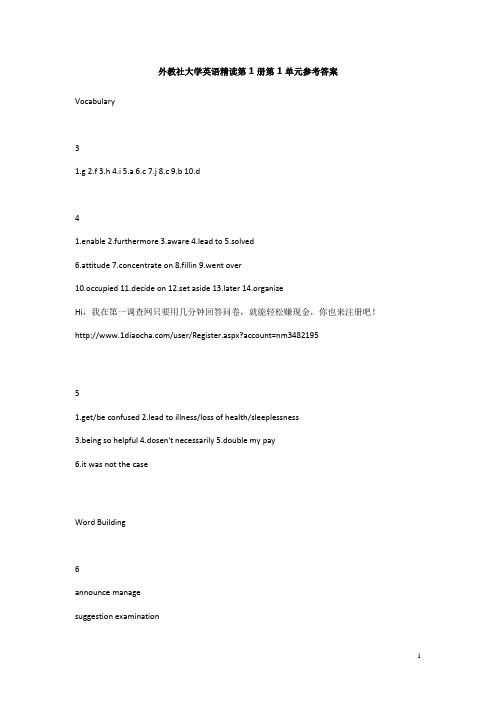
外教社大学英语精读第1册第1单元参考答案Vocabulary31.g2.f3.h4.i5.a6.c7.j8.c9.b 10.d41.enable2.furthermore3.aware4.lead to5.solved6.attitude7.concentrate on8.fillin9.went over10.occupied 11.decide on 12.set aside ter anizeHi,我在第一调查网只要用几分钟回答问卷,就能轻松赚现金,你也来注册吧!/user/Register.aspx?account=nm348219551.get/be confused2.lead to illness/loss of health/sleeplessness3.being so helpful4.dosen't necessarily5.double my pay6.it was not the caseWord Building6announce managesuggestion examinationconfuse combinedecision movementcomplete employproduction distractionorganize divideentertainment considerprotect recognizepermit exhibition71. 1)careful 2)cares 3)careless 4)care 5)carefully6)carelessness 7)carelessly 8)careful2. 1)addition 2)additional 3)add 4)additional3. 1)use 2)useless 3)use 4)useful 5)used 6)use4. 1)meaning 2)meaningful 3)means 4)comfort 5)means5. 1)comfortably 2)comfort 3)comfortable 4)comfort5)comfortable6. 1)probably 2)probability 3)probable 4)probably Structure81.so that I could read it when I was free2.so that she could receive it in the afternoon3.so that everyone could hear you4.and some eggs as well5.and plays as well6.and the United States as well7.and swims and skates as well8.give them an answer as soon as you can9.Read over the book as quickly as you can10.write home as often as he couldCloze9(A)(1)aware (2)performance (3)average (4)adequate (5)set aside(6)mentions (7)look over (8)commit (9)attitude (10)lead to(B)(1)if/one (2)about (3)it (4)know (5)up (6)as (7)from(8)words (9)into (10)other (11)for (12)whenTranslation101.His failure in the exam has made him aware of how importantit is to review his lessons regularly.2.Be sure not to forget what your parents said to you beforeyou left home.3.I'm sure her knowledge of English is adequate for the job.4.The purpose of this article is to tell the students how todevelop good study habits.5.In our age, people depend meor and more on computers tosolve various kinds of difficult problems.6.Skimming not only helps you get some ides of what you aregoing to read, but also helps you read faster and improveyour comprehension.7.Some people believe/think that boy's performance on test/in exams is always better than girls'. That is not necessarilythe case, however.8.Even students of average intelligence can become top studentsby improving their study habits.Key to Reading ActivityExercise B1.b2.d3.c4.b5.b6.a7.c8.a9.d 10.cExercise C1.蒂姆肯夫妇以一张7,000美元的支票付了学费,将女儿劳拉送进大学,以为此事就这样结束了。
现代大学英语精读1课后练习答案
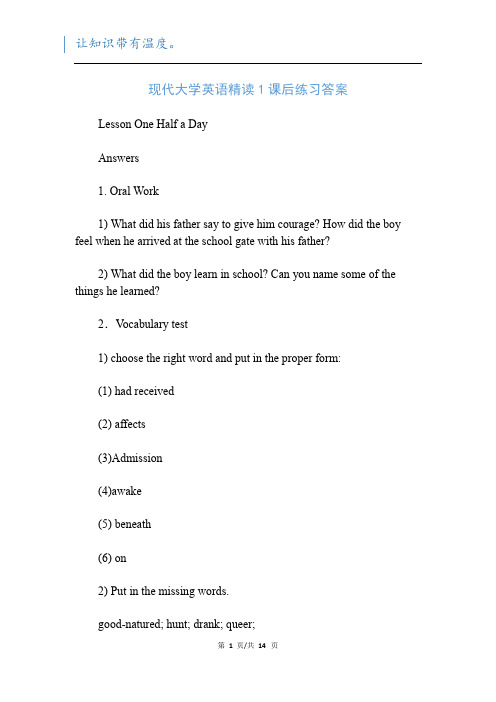
现代大学英语精读1课后练习答案Lesson One Half a DayAnswers1. Oral Work1) What did his father say to give him courage? How did the boy feel when he arrived at the school gate with his father?2) What did the boy learn in school? Can you name some of the things he learned?2.V ocabulary test1) choose the right word and put in the proper form:(1) had received(2) affects(3)Admission(4)awake(5) beneath(6) on2) Put in the missing words.good-natured; hunt; drank; queer;asleep; woke; occurred; absence;portrait; replace.3.Grammar WorkPut in the blanks with correct verb forms.(1) was surfing; was cut;(2) will have planted;(3) was; had not been;(4) has been married;(5) is; will be;(6) is; must have rained4.Written WorkWrite what you’ve learnt from the text about the little boy’s life in school in about 100 words.5.Translation(1)大概全部教导最有价值的结果就是培养你有具有让你完成你不得不做的任何该做的事,不管你愿不肯意做.(2)教导就是能让我们不断地发觉我们的无知.Lesson Two Going HomeAnswers1. Oral work(1) What do you know about these young people?(2) How did the young people feel when they heard the story ?2. V ocabulary test1) choose the right word and put in the proper form:(1) across(2) rise(3) attend/ take part in(4) reach(5) since(6) above/ below2) Put in the missing words.screaming; clenched; triumph; exaltation; except; stunned; misty; covered; ribbons; banner3.Grammar workTranslation.(1) Nobody could tell where the treasure was hidden.(2) The traffic will be very heavy on the road during the rush hour everyday.(3) He may have given her advice, but I doubt if it does her any good.(4) What she learned at university proved useful in her research .(5) If he had waited for the traffic lights to change, he would not have been killed.(6) If not I had seen him at the party yesterday evening !4. Written Work略.5. Translation(1)多给人原谅比多去责备(2)假如我们想要去爱,我们必需学会如何去原谅.Lesson Three Massage of the LandAnswers1. Oral work (answers omitted)2. V ocabulary test1)(1) unfaithful (2) take out(3) talk over (4) send for(5) sent away (6) send up2) Put the missing words(1) sick / ill (2) alone (3) out (4) phone (5) on(6) until (7) church (8) only (9) answered (10) needed (11) clever (12) save (13) bit (14) now3) Write the numbers in words.(1) Two hundred and eight(2) One thousand five hundred / fifteen hundred(3) Seven thousand, one hundred and twenty-eight.(4) two dollars six-five / two dollars and sixty-five cents.(5) fourth(6) twenty-first(7) thirtieth(8) one half, three quarters, four fifths3.Grammar work (answers omitted)4. Written WorkOne possible version:My parents were born, brought up and married on this land. They have been living there through their life. They got up at sunrise and retired with their chickens. They planted and reaped rice and raised a few goats, cows and chickens which could provide what they needed in their daily life.. However, the piece of lands was no longer fertile, bleeding year after year, like them, getting old and exhausted. The soil was not difficult to till when there was a lot of rain, but in a bad year, it was not only the ploughs that broke but their hearts, too. The farmer life is hard but my parents are enjoying it. They cherish their land and never want to leave it.5. Translation.1) 家再贫寒,也没有任何地方能和它比。
现代大学英语 Unit 1 Half a Day
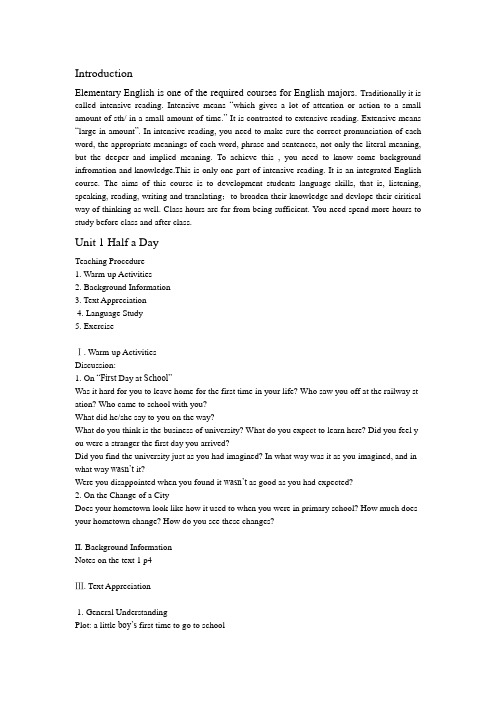
IntroductionElementary English is one of the required courses for English majors. Traditionally it is called intensive reading. Intensive means “which gives a lot of attention or action to a small amount of sth/ in a small amount of time.” It is contrasted to extensive reading. Extensive means “large in amount”. In intensive reading, you need to make sure the correct pronunciation of each word, the appropriate meanings of each word, phrase and sentences, not only the literal meaning, but the deeper and implied meaning. To achieve this , you need to know some background infromation and knowledge.This is only one part of intensive reading. It is an integrated English course. The aims of this course is to development students language skills, that is, listening, speaking, reading, writing and translating;to broaden their knowledge and devlope their ciritical way of thinking as well. Class hours are far from being sufficient. You need spend more hours to study before class and after class.Unit 1 Half a DayTeaching Procedure1. Warm-up Activities2. Background Information3. Text Appreciation4. Language Study5. ExerciseⅠ. Warm-up ActivitiesDiscussion:1. On “First Day at School”Was it hard for you to leave home for the first time in your life? Who saw you off at the railway st ation? Who came to school with you?What did he/she say to you on the way?What do you think is the business of university? What do you expect to learn here? Did you feel y ou were a stranger the first day you arrived?Did you find the university just as you had imagined? In what way was it as you imagined, and in what way wasn’t it?Were you disappointed when you found it wasn’t as good as you had expected?2. On the Change of a CityDoes your hometown look like how it used to when you were in primary school? How much does your hometown change? How do you see these changes?II. Background InformationNotes on the text 1 p4Ⅲ. Text Appreciation1. General UnderstandingPlot: a little boy’s first time to go to schoolSetting: on the way to schoolat schoolon the way homeProtagonists: ―I‖–the boy in the storyTheme :Writing devices:2. Thematic AnalysisEverything is changing!1. All my clothes are new.2. School makes useful men out of boys.3. My misgivings had had no basis.4. Our path was not totally sweet and unclouded.5. The lady would sometimes smile, but yell and scold often.6. The streets lined with the gardens disappeared.7. I turned out to be a grandpa.What changes are conveyed?changes on my part: clothes’ my view on school; my outer appearancechanges on other people’s part: the lady’s attitude toward uschanges in the society : the street crowded with cars, high buildings, rubbish and childrenThe following are a few possible understandings of the message the story conveys. Which one do you agree with? Argue with your group partners.Time and tide wait for no man.Life is a tragedy. There is nothing permanent in life but change. Education can never keep up wit h changes in society. Life is short and time is precious.Life is a dream. Do not take anything seriously.Time goes by quickly and many things can take place in your lifetime. Before you know it, a new society is born.3. Text StructurePart 1 (paras.1-7 ) : The boy’s misgivings about school. Questions for Part 1:①What does this part tell us about the boy’s relations with his parents?A: It seems that the boy was closer to his mother. Probably his mother was gentle while his father was strict.②How did the boy see school?A: A punishment (P 4); a prison (P6); a dreadful place③Read the following suggestions made by the father. Which ones do you agree with and which ones not? Have you ever been given some suggestions by your parents when entering the university? L ist them out.School is a place that makes useful men out of boys.Don’t you want to be useful like your brothers?Put a smile on your face and be a good example to others. Be a man.Today you truly begin life. A: Open.Part 2 (paras.8-16 ) :How the boy felt about schoolQuestions for Part 2: ① Did the boy change his attitude towards school after entering it? A: P 13.② How many experiences did the boy tell us about the school life? A: P14.Part 3 (paras.17-20 ):Walking out of the school, he found time had changed everything. Questions for Part 3:① What did he see on his way home?A: P17. ② How do you understand the ending? What is the effect of this writing strategy? Do you know any other novels/stories written with the same strategy?A: The protagonist returns after being absent for a short time to find everything changed beyond re cognition.Washington Irving’s Rip Van Winkle. Rip was a simple good-natured man. One fine day he went with his dog to the mountains to hunt squirrels. He drank something a queer old man offered him, and fell fast asleep. When he woke up he found himself an old man and that great changes had occ urred in his village during his absence. In the village inn the portrait of King George 3 had been re placed by one of General Washington. This technique is often used to emphasize rapid changes in society.《贾奉雉》from《聊斋》贾奉雉才名冠世,考试却屡战屡败。
大学英语精读第一册(第三版)答案

大学英语精读第三版(上海外语教育出版社董亚芬主编)第一册答案Book 1 Unit 1Study&Practice V ocabulary Activities1.1)e 2)g 3)j 4)a 5)b 6)i 7)c 8)d 9)h 10)f2.1) handling2) summarized3) process4) absorb5) are bound to6) feel free7) for instance8) strategies9) complained10) has committed... to memory11) Nevertheless12) rely... on13) Apart from14) command3.1) over and over again2) at a time3) put it into practice4) watching out for5) by no means6) concentrate on7) In addition to8) in detailEnriching Y our Word Power1.1)action2)employ3)announce4)examination5)communication6)express7)compose8)improvement9)concentration10)management11)consider12)motivate13)development14)movement15)discuss16)operate17)division18)production19)educate20)repeat2.1) a) additional b) add c) addition d) addition2) a) effectively b) effect c) effective d) effect3) a)helpful b) help c) helpless d) help e) helplessly f) helpfully g) helpful4) a) reliant b) reliable c) reliance, reliable d) relies e) reliably5) a) repetition b) repeating c) repeatedly d) repeated e) repetitionUsage1) In my opinion2) According to Mary3) In our opinion4) According to today’s papers5) In most doctors’ opinion ( According to most doctors)Structure1.1) Shakespeare was not only a dramatist but also an actor.2) Miss Crain not only took me home in her car, but also came the next day to see if I had recovered.3) Hainan Island attracts tourists not only in winter but also in summer.4) There is always a black market not only in Britain, but also in other European countries.5) At the Athens Olympics in 2004, Liu Xiang not only won a gold medal in the 110-meter hurdles, but also broke the Olympic record.2.1) It is true that your sentences are all gr ammatically correct, but they don’t make any sense.2) It is true that they lost that battle, but they still went on fighting.3) It is true that Tom’s very clever and hardworking, but I still don’t think he is the right person for the job.4) It is true that learning English is by no means easy, but we can make the task easier by using some learning strategies.Cloze1.1) strategies2) frequently3) over and over again4) commit to memory5) acquaintance6) watch out for7) communicate8) process9) opportunities10) rely on11) put into practice12) absorbed2.1) if2) about3) it4) know5) up6) as7) addition8) even9) into10) other11) for12) whileSpot Dictation1) memorize2) a matter of3) taught4) shelf5) realize6) written7) idiomatic8) join in9) difference10) gain a good commandTranslation1) 史密斯太太对我抱怨说,她经常发现与自己十六岁的女儿简直无法沟通。
(完整版)大学英语精读第一册课后练习部分答案
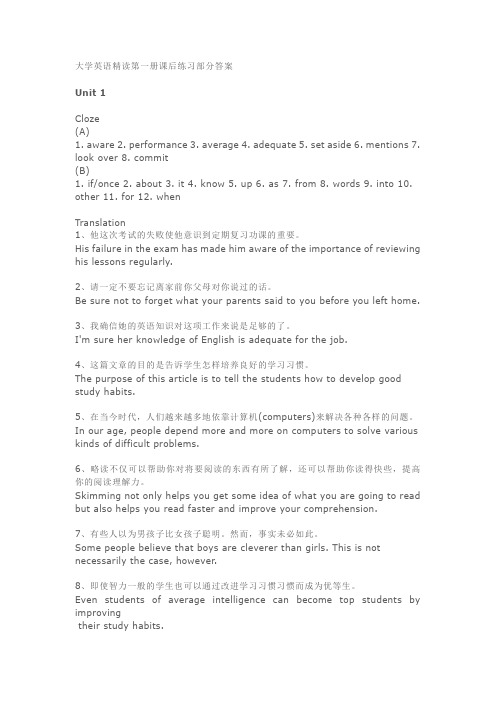
大学英语精读第一册课后练习部分答案Unit 1Cloze(A)1. aware2. performance3. average4. adequate5. set aside6. mentions7. look over8. commit(B)1. if/once2. about3. it4. know5. up6. as7. from8. words9. into 10. other 11. for 12. whenTranslation1、他这次考试的失败使他意识到定期复习功课的重要。
His failure in the exam has made him aware of the importance of reviewing his lessons regularly.2、请一定不要忘记离家前你父母对你说过的话。
Be sure not to forget what your parents said to you before you left home.3、我确信她的英语知识对这项工作来说是足够的了。
I'm sure her knowledge of English is adequate for the job.4、这篇文章的目的是告诉学生怎样培养良好的学习习惯。
The purpose of this article is to tell the students how to develop good study habits.5、在当今时代,人们越来越多地依靠计算机(computers)来解决各种各样的问题。
In our age, people depend more and more on computers to solve various kinds of difficult problems.6、略读不仅可以帮助你对将要阅读的东西有所了解,还可以帮助你读得快些,提高你的阅读理解力。
Unit1-现代大学英语精读第一册Half-a-Day答案

现代大学英语精读Book One 课后练习答案Unit One Half a DayV ocabulary1 Become familiar with the rules of word formationI identify the parts of speech of the following words and list the suffixes used.Noun suffixes:-tion,-ment, -ing, -ness, -or/erAdjective suffixes: -ful, -less, -ed.Adverb suffixes: -ly2 Write down the corresponding adverbs, adjectives, nouns or verbs of the following words.1. Their corresponding adverbs are:Simply, hurriedly, terribly, possibly, miserably, politely, fortunately, practically, physically, favorably, roughly, seriously.2. Their corresponding adjectives are:Complete, accurate, particular, total, absolute, easy, angry, miserable, exact, final.3. Their corresponding nouns are:Power(powerfulness), success(successfulness), care(carefulness),tear(tearfulness), meaning(meaninglessness), home(homelessness), price (pricelessness)4. Their corresponding verbs are:Express, impress, attend, celebrate, attract, spell, produce, pollute, prevent, oppose, organize, inform, appoint, require, judge.3 Translate1. 一个有用的词,2一条很有帮助的建议3. 一次痛苦的经历4. 一个含泪的声音5. 一场无望的战争 6 一颗无价的宝石7. 一本无用的书8. 仔细一看9. 一个多事的年份10.一个有害的习惯11. 一只对人无害的动物12. 一个无耻的撒谎者13.一个无阶级的社会14. 很有希望的形势15.一次富有成果的访问16. 一支强大的军队17. 一个粗心的错误18. 一个无家可的孩子19. 一个牙齿已掉光的老汉20.一朵无名的花。
现代大学英语听力答案【第一册 unit1】

Answer to unit oneTask1: A1)Susan Hudson and Intercultural Communication.2)The class will meet in the room they are in now and on Tuesdays and Thursdays from 3:15 to4:50.3)They can purchase the textbooks at the bookstore the day after tomorrow.4)The office hours are from 1:00 to 2:00 on Wednesdays.B1) the first half the research lab Thursday 405 the last two months2) outline performance quizzes project participationTask2: A1)According to the syllabus, the book he is looking fo r is in the library, but he couldn’t find it.2)That means the student cannot find the book on the shelves in its usual place. She/He needs togo to a special room called the reserve room.3)The professor wants every one in the class to read the chapter. If one student removes thebook from the library, it is likely that none of the other students will have the opportunity to read it. So, the professor has insured that all students have the opportunity to read it on reserve.B1) F 2) T 3)FTask3: A1) c 2) cBUndergraduate five two Graduate fifteen two 50 overdue 15 cannot 8:00am 9:00pm 9:00am 8:30pm Sundays1)Because now they have someone from the international center coming to speak to the studentson extracurricular activities.2)They want to show students around the university, including the union building, the library,and the student services building.C1) up to their ears hard pressed2) jot grab off3)finding a needle in a haystack4)bottom line runningTask5:1)The student wants to have some information about the courses at Swan School.2)Each course lasts for three weeks.3)It’s about 23 hours a week. Usually four and a half days each week.4)The first course begins on the 3rd of July and lasts until the 20th of July and the second courseis from the 24th of July until the 10th of August.5)Each course costs £150 plus V A T, which is 15 percent, and a £5 registration fee.6)For each course the deposit is £207) A lady arranges the accommodation for the students with Oxford families.8)They can choose to have bed and breakfast only which is £20 a week, or bed, breakfast anddinner which is about £27 a week.Task6: A1) F 2)T 3)FB1)Most universities will not accept students without this test. It is also used to decide how muchfinancial aid should be given to each student.2)They must score between 1430 and 1600.3)American u niversities also look at a student’s subject grades, what they do outside of school,and their teachers’ recommendations.4)The SAT Ⅱis the one-hour exam that can be taken in any subject, for example chemistry orFrench.Task7: A1) a2) c3) d4) cB1)Many students attend special preparation schools besides their regular classes, in order to passthe exam for the best universities such as the national University of Tokyo.2)These extra schools can last for one to two years between high school and university.Task8: A1)It’s a non-profit-making educational foundation.2)No, complete beginners are not accepted.3)Other subjects available within the General English timetable include English for Businessand English Literature.B1) 200 30-40 attractive beautiful within easy reach of2) dining rooms a library language laboratories computers tennis volleyball basketball badminton football3) 214)£11305)Monday Friday6)£670 3 10 9 31/2Task9: A1)This school has a capacity of 220 students.2)It is located in a quiet tree-filled square close to Victoria Station in central London.3)In addition to the 15 lessons, there are daily individual laboratory sessions and lectures on lifein Britain at no extra cost.4)There is a special 2-week Easter Course and Refresher Courses for overseas teachers ofEnglish in the summer.B1) F2) Fask10: A1)This school, founded in 1953, is a non-profit making Charitable Trust.2)It is situated in residential North Oxford, 3 km from the city center.3) A particular benefit for the EFL student is the opportunity to live and study with nativeEnglish speakers taking the two-year International Baccalaureate course, or courses at university level.4)Their extracurricular activities include sports, horse riding, drama, art, crafts, photography,films, concerts and excursions.B1) an excellent library video room science laboratories coffee bar2) college houses a resident warden family accommodation。
现代大学英语 B1U1 课后练习参考答案 Half a Day
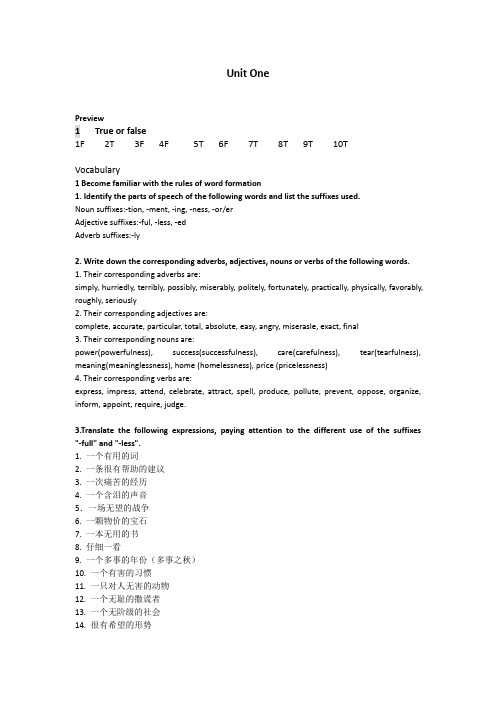
Unit OnePreview1 True or false1F 2T 3F 4F 5T 6F 7T 8T 9T 10TVocabulary1 Become familiar with the rules of word formation1. Identify the parts of speech of the following words and list the suffixes used.Noun suffixes:-tion, -ment, -ing, -ness, -or/erAdjective suffixes:-ful, -less, -edAdverb suffixes:-ly2. Write down the corresponding adverbs, adjectives, nouns or verbs of the following words. 1. Their corresponding adverbs are:simply, hurriedly, terribly, possibly, miserably, politely, fortunately, practically, physically, favorably, roughly, seriously2. Their corresponding adjectives are:complete, accurate, particular, total, absolute, easy, angry, miserasle, exact, final3. Their corresponding nouns are:power(powerfulness), success(successfulness), care(carefulness), tear(tearfulness), meaning(meaninglessness), home (homelessness), price (pricelessness)4. Their corresponding verbs are:express, impress, attend, celebrate, attract, spell, produce, pollute, prevent, oppose, organize, inform, appoint, require, judge.3.Translate the following expressions, paying attention to the different use of the suffixes "-full" and "-less".1. 一个有用的词2. 一条很有帮助的建议3. 一次痛苦的经历4. 一个含泪的声音5.一场无望的战争6. 一颗物价的宝石7. 一本无用的书8. 仔细一看9. 一个多事的年份(多事之秋)10. 一个有害的习惯11. 一只对人无害的动物12. 一个无耻的撒谎者13. 一个无阶级的社会14. 很有希望的形势15. 一次富有成果的访问16. 一支强大的军队17.一个粗心的错误18. 一个无家可归的孩子19. 一个牙齿已掉光的老汉20. 一朵无名的花4 Complete the sentences by translating the Chinese in the brackets.1.differ2.differently, different3.difference4.serious, serious, seriously5.seriousness, seriously polluted6.Fortunately/Luckily, pollution, seriously, pollute7.attention8.attentively, attentive2. Complete the following verb+noun collocations or expressions1. take2. lose/find3. dry4. play5 take/have6. tell/read/write7. change/speak/read/cross8. life/facts/reality/difficulties9. an event/a plan/the news/the death/the marriage10. a country/a place/privacy11. a river/a street/a bridge/a desert/ the sea12. an end/ a decision/a place13. workers/waiters/servants/people3 Fill in the blanks with the correct forms of the phrases and expression listed below. Some of them may be used more than once and there may be more than one correct answer.1.on their own2.show off3.burst into4.given rise to5.brought about6.to resort to7.clinging to8.gave rise to9.took advantage of10.in vain, make, out of4 Translate the following sentences using words and expressions taken from the text1.They took advantage of our helpless situation and took over our company.2.Although there are still difficulties ahead of us, I am sure that we Chinese people will havethe wisdom to bring about the peaceful unification of our country on our own.3.It is wrong to put emphasis on nothing but GDP. It will give rise to many serious problems.4.He loves to show off his wealth, but that is all in vain. People still avoid him as though hewere poison.5.He soon fell in love with the village and was determined to make it a beautiful gardentogether with other villagers.6.We must spend more money fighting against global warming. In addition, we must resort totough laws. It is not just a matter of money.7.When the police arrived at the school, the students and teachers were still in a daze.8.This corrupt official was still clinging to his power. He refused to step aside.9.When the man finally came into view, I found it was my father. I didn’t know how hemanaged to find this place in the blinding snow. At that moment, I burst into tears.10.She glanced at him from time to time. It was the first time in her life that she had foundherself looking at a young man like that.5 Fill in the blanks with the correct prepositions or adverbs.1.of2.from3.for4.out5.up6.up7.up for8.out9.with10.of11.of12.of13.up6. Complete the sentences by translating the Chinese in the brackets1.the door locked, very angry2.the city gate wide open, playing the guqin, it very strange3.quite obvious/clear, his successor4.worried/anxious, talking to yourself5.so heavily polluted, pay (the price)6.the ground shaking/trembling/quaking, rolling downugh, laugh himself8.put these things in order, do it9.lying in the grass, covered with blood10.interested in gardening or painting, keep him busy11.hear her say, put off/postponed7 Fill in each blank with the correct form of the appropriate word or phrase in the brackets. Note that more than one of them may be appropriate1.high/tall, huge2.vast, high3.tall, big/large4.every, affairs5.matter, countries/nations, big/huge6.affair, nation, matter7.state8. a few, big/huge/great, high9.everything, something10.Anybody, any ,nothing, nothing, nothing11.little, few, a little, a fewGrammar1. Combine each pair of the sentences following on e of the examples1. Those who went the lecture hall early had the front seats.2. A dictionary is a book that explains the meaning and usage of words.3. A library is a building or an organization that has a collection of books for people to read or borrow.4. The man employed at the drug store is my cousin.5. Those who want o join the drama club please sign up here.6. I was born in a village surrounded by hills on three sides.7. In the center of the room stood a large table covered with the cleanest tablecloth I had ever seen.8. Those who had the least to give often gave the most9. God teachers are those who encourage students to work on their own and think for themselves.3. Fill in the blanks with ONE suitable word.1. easy2. beginning3. But4. suddenly5. worried6. If7. master8. number 9. habit 10. go4 Translate the following sentences into English.1.Before I came to/entered college, I had never thought life at college would be so rich andinteresting.2.Most of the Chinese college students born in the 1990s are the only child of their families.3.All those who know him admire him for his work.4.I missed the class because I didn’t know it had moved up to Thursday.5.In some countries, those who are overweight will be punished one way or another.6.Soon after the fire, those who had lost their homes were taken to a place of safety.7.When we met again, we found we both had changed a lot.8. A team of experts headed by Professor Li will soon come and help farmers solve theirproblems.9.The field planted with tomatoes used to be wasteland.10.Our teacher told us to read books written by such masters as Mao Dun and Ba Jin.5. Identify and correct the mistake(s) in each of the sentences1. Every day, my father takes me to school himself.2. Hardship can turn a boy into a man. /Hardships can make a man out of a boy.3. We tried to persuade him not to do that, but in vain.4. Last week, I read an interesting story that h ad taken place during WWII5. He searched his room for the book but I didn't find it.6. I tried to put on a brace face, but failed.7. We must take advantage of the opportunities coming our way.8. When I was a small boy, I would often sit for hours playing with the few toys I had.9. Sixteen years of teaching school mad/have made an experienced educator out of a timid girl.10. Before I came, I had imagined college was a paradise where I could relax after stressful three years of high school.。
最新大学精读第一册-Half-a-dayPPT课件

大学精读第一册-Half-a-day
❖ .THE VALUE OF TIME
❖ Plan your time carefully. Make a list of your weekly tasks. Then make a schedule or chart of your time. Fill in committed time such as eating, sleeping, meetings, classes, etc. Then decide on good, regular times for studying. Be sure to set aside enough time to complete your normal reading and work assignments. Of course,
The End
制作人:于洋
the school life was colirful, he made many friends and 4
could learn a lot there.
4
“rivalries”in this context refers to competition among
-
students in the same class or grade.
2
She meat that the teachers here would look after the
-
school children like their mothers and fathers.
3
现代大学英语精读1unit1课后练习答案
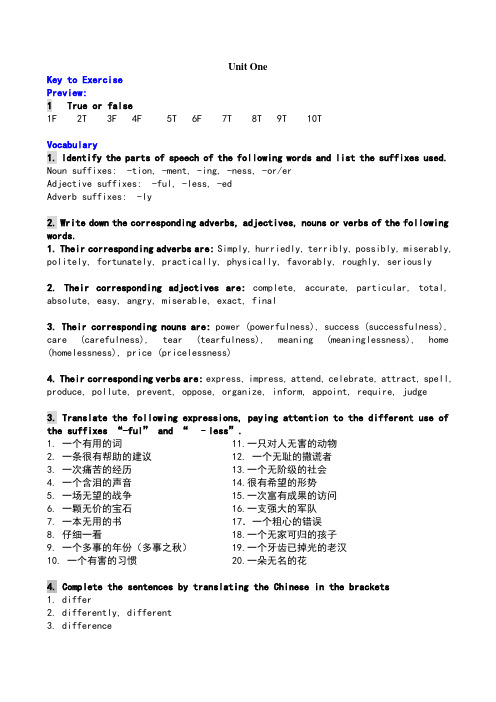
Unit OneKey to ExercisePreview:1 True or false1F 2T 3F 4F 5T 6F 7T 8T 9T 10TVocabulary1. Identify the parts of speech of the following words and list the suffixes used. Noun suffixes: -tion, -ment, -ing, -ness, -or/erAdjective suffixes: -ful, -less, -edAdverb suffixes: -ly2. Write down the corresponding adverbs, adjectives, nouns or verbs of the following words.1. Their corresponding adverbs are: Simply, hurriedly, terribly, possibly, miserably, politely, fortunately, practically, physically, favorably, roughly, seriously2. Their corresponding adjectives are: complete, accurate, particular, total, absolute, easy, angry, miserable, exact, final3. Their corresponding nouns are: power (powerfulness), success (successfulness), care (carefulness), tear (tearfulness), meaning (meaninglessness), home (homelessness), price (pricelessness)4. Their corresponding verbs are:express, impress, attend, celebrate, attract, spell, produce, pollute, prevent, oppose, organize, inform, appoint, require, judge3. Translate the following expressions, paying attention to the different use of the suffixes “-ful” and “–less”.1. 一个有用的词 11.一只对人无害的动物2. 一条很有帮助的建议 12. 一个无耻的撒谎者3. 一次痛苦的经历 13.一个无阶级的社会4. 一个含泪的声音 14.很有希望的形势5. 一场无望的战争 15.一次富有成果的访问6. 一颗无价的宝石 16.一支强大的军队7. 一本无用的书 17.一个粗心的错误8. 仔细一看 18.一个无家可归的孩子9. 一个多事的年份(多事之秋) 19.一个牙齿已掉光的老汉10. 一个有害的习惯 20.一朵无名的花plete the sentences by translating the Chinese in the brackets1. differ2. differently, different3. difference4. serious, serious, seriously5. seriousness, seriously polluted6. Fortunately/ Luckily, pollution, seriously, pollute7. attention8. attentively, attentive2 Complete the following verb + noun collocations or expressions.1. Take2. lose/find3. dry4. play5. take/have6. tell/read/write7. change/speak/read/cross8. life/facts/reality/difficulties9. an event/a plan/the news/the death/the marriage10. a country/a place/privacy11. a river/a street/a bridge/a desert/the sea12. an end/a decision/a place13. workers/waiters/servants/people4 Translate the following sentences using words and expressions taken from the text.1. 他们利用我们求助无门的困境把我们公司接管了。
现代大学英语1-unit-1-half-a-day-自编课件
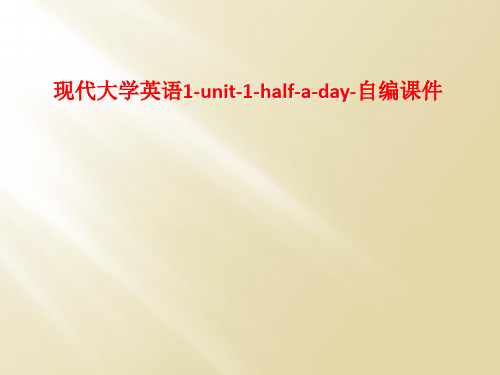
His writing style
u The Legend of Sleepy Hollow
睡谷传奇, 华盛顿.欧文
Rip Van Winkle by Washington Irving
u Rip went to hunt squirrels. He drank something a queer old man offered him and fell fast asleep. When he woke up he found himself an old man and that great changes had occurred in his village during his absence.
Comprehensive Reading ---- The author His writing style
u His works combined realism & symbolism
u In this text, a strategy used in
fiction writing---the
The second, Palace of Desire covered the changing times of the 1920s.
The third book, Sugar Street
The Cairo Trilogy (first published in 1957)
brings the family into Байду номын сангаасhe mid 20th century.
现代大学英语1-unit-1-half-a-day-自编课件
Contents
ØBrainstorming
Ø About the author Ø Skimming and scanning Ø Group discussion
现代大学英语1-unit-1-half-a-day精品PPT课件

纳吉布·马哈富兹
Born in 1911, educated at Cairo University
Wrote short stories and historical novels
before WWII and novels of social realism
after WWII
◆ the first Arabic-language author
2021/1/20
14
Comprehensive Reading ---- The author
His influence
The first Arab Writer to win the Nobel Prize in Literature – 1988, The Cairo Trilogy
His works have been compared in spirit and tone to
Rip Van Winkle by Washington Irving
Rip went to hunt squirrels. He drank something a queer old man offered him and fell fast asleep. When he woke up he found himself an old man and that great changes had occurred in his village during his absence.
text
Half a Day
Contents
➢Brainstorming
➢ About the author ➢ Skimming and scanning ➢ Group discussion
现代大学英语精读(第二版)第一册课后练习答案(完整版)
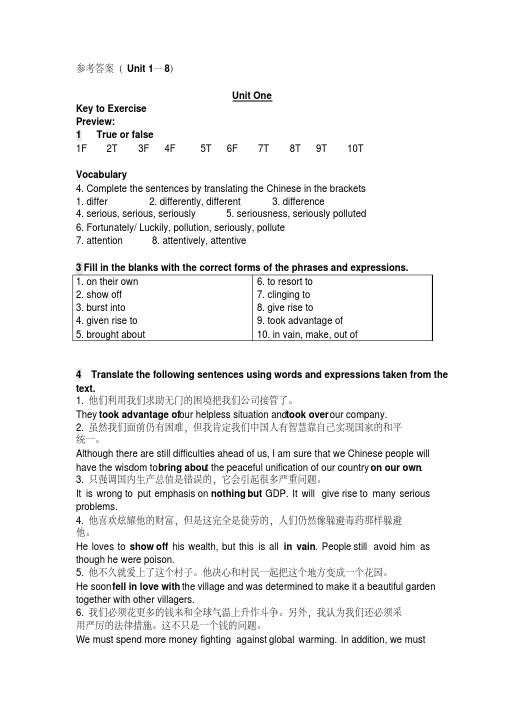
参考答案(Unit 1—8)Unit OneKey to ExercisePreview:1 True or false1F 2T 3F 4F 5T 6F 7T 8T 9T 10TVocabulary4. Complete the sentences by translating the Chinese in the brackets1. differ2. differently, different3. difference4. serious, serious, seriously5. seriousness, seriously polluted6. Fortunately/ Luckily, pollution, seriously, pollute7. attention 8. attentively, attentive3 Fill in the blanks with the correct forms of the phrases and expressions.1. on their own2. show off3. burst into4. given rise to5. brought about6. to resort to7. clinging to8. give rise to9. took advantage of10. in vain, make, out of4 Translate the following sentences using words and expressions taken from the text.1. 他们利用我们求助无门的困境把我们公司接管了。
They took advantage of our helpless situation and took over our company.2. 虽然我们面前仍有困难,但我肯定我们中国人有智慧靠自己实现国家的和平统一。
现代大学英语精读1课后答案

现代大学英语精读1课后答案Unit OneKey to ExercisePreview:1、True or false1F 2T 3F 4F 5T 6F 7T 8T 9T 10T2、Vocabulary4. Complete the sentences by translating the Chinese in the brackets1. differ2. differently, different3. difference4. serious, serious, seriously5. seriousness, seriously polluted6. Fortunately/ Luckily, pollution, seriously, pollute7. attention 8. attentively, attentive3、Fill in the blanks with the correct forms of the phrases and expressions.4、Translate the following sentences using words and expressions taken from the text.1. 他们利用我们求助无门的困境把我们公司接管了。
They took advantage of our helpless situation and took over our company.2. 虽然我们面前仍有困难,但我肯定我们中国人有智慧靠自己实现国家的和平统一。
Although there are still difficulties ahead of us, I am sure that we Chinese people will have the wisdom to bring abou t the peaceful unification of our country on our own.3. 只强调国内生产总值是错误的,它会引起很多严重问题。
- 1、下载文档前请自行甄别文档内容的完整性,平台不提供额外的编辑、内容补充、找答案等附加服务。
- 2、"仅部分预览"的文档,不可在线预览部分如存在完整性等问题,可反馈申请退款(可完整预览的文档不适用该条件!)。
- 3、如文档侵犯您的权益,请联系客服反馈,我们会尽快为您处理(人工客服工作时间:9:00-18:30)。
现代大学英语精读Book One 课后练习答案Unit One Half a DayV ocabulary1 Become familiar with the rules of word formationI identify the parts of speech of the following words and list the suffixes used.Noun suffixes:-tion,-ment, -ing, -ness, -or/erAdjective suffixes: -ful, -less, -ed.Adverb suffixes: -ly2 Write down the corresponding adverbs, adjectives, nouns or verbs of the following words.1. Their corresponding adverbs are:Simply, hurriedly, terribly, possibly, miserably, politely, fortunately, practically, physically, favorably, roughly, seriously.2. Their corresponding adjectives are:Complete, accurate, particular, total, absolute, easy, angry, miserable, exact, final.3. Their corresponding nouns are:Power(powerfulness), success(successfulness), care(carefulness),tear(tearfulness), meaning(meaninglessness), home(homelessness), price (pricelessness)4. Their corresponding verbs are:Express, impress, attend, celebrate, attract, spell, produce, pollute, prevent, oppose, organize, inform, appoint, require, judge.3 Translate1. 一个有用的词,2一条很有帮助的建议3. 一次痛苦的经历4. 一个含泪的声音5. 一场无望的战争 6 一颗无价的宝石7. 一本无用的书8. 仔细一看9. 一个多事的年份10.一个有害的习惯11. 一只对人无害的动物12. 一个无耻的撒谎者13.一个无阶级的社会14. 很有希望的形势15.一次富有成果的访问16. 一支强大的军队17. 一个粗心的错误18. 一个无家可的孩子19. 一个牙齿已掉光的老汉20.一朵无名的花。
4.Complete the sentence by translating the Chinese in the brackets1.differ2. 2. differently, different3. 3. difference.4. serious, serious, seriously5. seriousness, seriously polluted.6. Fortunately/Luckily, pollution, seriously, pollute7. attention.8. attentively, attentive.2. complete the following verb+noun collocations or expression1. take2. lose/find3. dry4. play5. take/have6. tell/read/write7. change/speak/read/cross8. life/facts/reality/difficulties9. an event/a plan/ the news/ the death/ the marriage10. a country/ a place/ privacy11. a river/ a street/ a bridge/ a desert/ the sea12. an end/ a decision/ a place14. workers/ waiters/ servants/ people.3 Fill the blanks with the correct forms of phrases and expressions listed below.1. on their own2. show off3. burst into4. give rise to5. brought about6. to resort to7. clinging to8. gave rise to9. took advantage of10. in vain, make, out of4.Translate the following sentences using words and expressions take from thetext.5.Fill in the blanks with the correct prepositions or adverbs1.of2.from.3.for4.out5.up.6.up7.up for8.out9.with10.of11.of12.of13.upplete the sentences by translating the Chinese in the brackets.1.the door locked, very angry2.the city gate wide open, playing the guqin, it very strange3.quite obvious/clear, his successor4.worried/anxious, talking to yourself5.so heavily polluted, pay (the price)6.the ground shaking/trembling/quaking, rolling downugh, laugh himself8.put these things in order, do it9.lying in the grass, covered with blood10.interested in gardening or painting, keep him busy11.hear her say,put off/postponed7. Fill in each blank with the correct form1.high/tall, huge2.vast, high3.tall, big/large4.every, affairs5.matter, countries/nations, big/huge6.affair, nation, matter7.state8. a few, gig/huge/great, high9.everything, something10.Anybody, any, nothing, nothing, nothing11.little, few, a little, a fewGrammarbine each pair of the sentences following one of the examples.1.Those who went to the lecture hall early had the front seats.2. A dictionary is a book that explains the meaning and usage of words.3. A library is a building or an organization that has a collection of books for peopleto read o r borrow.4.The man employed at the drug store is my cousin5.Those who want to join the drama club please sigh up here.6.I was born in a village surrounded by hills on three sides.7.In the center of the room stood a large table covered with the cleaners tablecloth Ihad ever see.8.Those who had the least to give often gave the most.9.Good teachers are those who encourage students to wok on their own an think forthemselves.2.Fill in the blanks with the correct form of the words in the brackets.1.had overslept2.had invited3.was born, had left4.had gone, told5.had worked, were admitted6.loved, had always been7.was had been8.became, had read9.returned, came10.met, had once treated, said, was, had done, forgave, asked.3.Fill in each blank of the passage with ONE suitable word.(1) easy (2) beginning (3) But (4) suddenly (5) worried (6) If (7) master (8) number (9) habit (10) go4.Translate the following sentences into English1.Before I came to / entered college, I had never though life at college would be sorich and interesting2.Most of the Chinese college students born in the 1990s are the only child of theirfamilies.3.All those who know him admire him for his work.4.I missed the class because I didn’t know it had moved up to Thursday.5.In some countries, those who are overweight will be punished on way or another.6.Soon after the fire, those who had lost their homes were taken to a place of safety.7.When we met again, we found we both had changed a lot.8. A team of experts headed by Professor Li will soon come and help farmers solvetheir problems.9.The field planted with tomatoes used to be wasteland10.Our teacher told us to read books written by such masters as Mao Dun and Ba Jin.5.Identify and correct the mistake(s) in each of the sentences.1.Every day, my father takes me to school himself.2.Hardships can turn a boy into a man.3.We tried to persuade him not to do that, but in vain.st week, I read an interesting story that had taken place during WWII5.He searched his room for the book but didn’t find it.6.I tried to put on a brave face, but failed.7.We must take advantage of the opportunities coming our way.8.When I was a small boy, I would often sit for hours playing with the few toys Ihad.9.Sixteen years of teaching school made/have made an experienced educator out ofa timid girl.10.Before I came, I had imagined college was a paradise where I could relax afterthe stressful three years of high school.。
